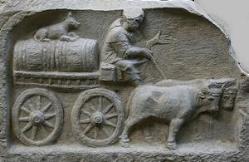Lateinische Sprachrelikte im bayerischen Dialekt
Times
Ur-Bayerisch ist keine Variante der deutschen Sprache, sondern Latein.
 Ö ha brrr
Ö ha brrrTHE TIMES | Saturday October 12 2024 Is Bavarian a language? Better ask a Yorkshireman Campaigners hope they can save Germany's dwindling regional dialects from extinction, writes Oliver Moody 1 glab dir brennt da Huat! Glei foid da Wadschnbam um. Readers who find the above sentences utterly impenetrable are in good company. Even for many Germans, the Bavarian dialect, also known as Boarisch, can be tricky to understand. Neither doesaliteral translation “I believe your hat is on fire. A slap-tree will follow right away” — necessarily help to elucidate the meaning. which is: “I believe you are mad and deserve to have your ears boxed.” Bavarian a are now lobbying to have this distinctive linguistic heritage formally recognised and protected as a regional language, on a par with Cornish, Welsh or Catalan. Although there are some tactical disagreements and entrenched personal feuds over how precisely to get this status, it appears increasingly likely that the campaigners will get their way. The issue is expected to be debated shortly by the Bavarian state parliament. One of the star witnesses for the campaign is a Yorkshireman. Anthony Rowley became acquainted with the dialect while studying for his underpraduate degree in German. when he spent his vear abroad in the Bavarian city of Regensburg. The habit stuck, and today he is professor of German at Munich university and a world authority on Bavarian. “A language is just a dialect with an army and a navy. Ifyou have a state behind you, then you have a language. * Rowley said, “The case [for recognising Bavarian as a language] is very, very strong.” Bavarian for beginners 1 gah zum Schmied und ned zum Schmiedi Translation: | will go to the smith and not to the smith’s apprentice Meaning: | wish to speak with your manager Wenn's Oarscher! brummt, és Herzal gsund Translation: If the posterior is tumbling. the heart is healthy Meaning: Flatulence-inducing food is good for you Zwoa Holbe san aaa Lebakassemme Translation: Two halves also make a meatioaf roll Meaning: Cheers! Germany's regional dialects were once the primary form of the language for must speakers. In Thomas Mann's classic novel Buddenbrooks, set at the end of the 19th century, one character moves from Lübeck in the north to join her husband in Munich and finds that the languages of her birthplace and her adopted home are mutually almost unintetligible. Even by that point. though, the standardised form of modern German. called Hochdeutsch or High German, was rising to a position of dominance. These days, only two fifths of Germans say they are fluent in their local dialect, according to a study published last month by academies at the Mannheim Institute for the German Language. In parts of the north, the figure is as low as one in five. The southern dialects are in comparatively rude health, however. and about two thirds of Bavarians claim to be conversant with Boarisch. No one is quite sure what explains this regional divide. One factor, according to Rowley, may be that the spread of High German was originally driven in large part by Lutheran Protestantism, which put down significantly deeper roots in the north than in the south. Another theory is that it was powered by the German. nationalist movement in the early 19th century. which was strongest in Prussia and relatively muted in Bavaria. Concerns persist. though. that the dialect could yet be crowded out by the ubiquity of High German and English. particularly in the younger generations. The Bavarian Language Association argues that Boarisch and related dialects are at risk of extinction. Various groups have been pushing for decades for Bavarian to be given the status of a language, but they struggled to get a hearing during the years after German reunification in 1990. Another difficulty is that Bavarian is not so much asingle dialect as a family of local micro-dialects with no standardised written form. However, Rowley said the political climate now seemed to be much more propitious, in part because regional identity is resurgent in Bavaria and other areas of the country. There are still a series of hurdles to be jumped: the state parliament in Munich, the Bundestag in Berlin, and then the Council of Europe in Strasbourg, which maintains a list of 91 protected minority and regional languages. Among them are Plattdeutsch (Low German), a northern form of German that bears a passing sonic resemblance to English, and two forms of Frisian, a Germanic language spoken in the northwest. Rowley acknowledged that adding Bavarian to the list would be very likely tolead too chain reaction as speakers of ather German dialects, such as Saxon and Swabian, sought the same protections. “That would not necessarily be a bad thing.” he said.